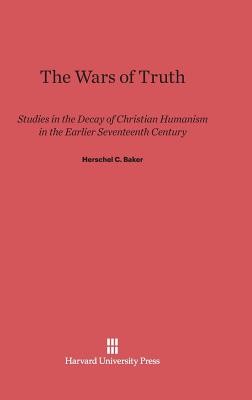
- We will send in 10–14 business days.
- Author: Herschel C Baker
- Publisher: Harvard University Press
- ISBN-10: 0674730607
- ISBN-13: 9780674730601
- Format: 15.6 x 23.4 x 2.4 cm, hardcover
- Language: English
- SAVE -10% with code: EXTRA
Reviews
Description
With this book I bring to a close the studies begun in The 'Dignity of Man' Since the present work is a thematic and chronological extension of, if not precisely a sequel to, its predecessor, a common title might have served for both; however, here my subject is the deterioration, or at least the radical mutation, of the idea whose development I earlier tried to trace. More specifically, I am here concerned with the traditional and the emerging concepts of 'truth'-theological, scientific, political, and other-whose collision generated such heat and even such light in the age of Milton. I have tried to describe, at least in broad terms, the meshing of those inherited and newly formulated values which in my judgment gives the period its peculiar poignancy and relevance for the modern world. Between the birth and death of Milton English thought underwent a transformation whose consequences we perhaps do not fully understand even now. Yet in attempting to seek out the origins of this transformation in the early Renaissance and to sketch its progress through the earlier seventeenth century I have sought to indicate the intellectual and emotional pressures which shaped men's conception of 'truth' and of their capacity to attain it, and to suggest some of the consequences for literature. -from the Preface
EXTRA 10 % discount with code: EXTRA
The promotion ends in 19d.15:27:17
The discount code is valid when purchasing from 10 €. Discounts do not stack.
- Author: Herschel C Baker
- Publisher: Harvard University Press
- ISBN-10: 0674730607
- ISBN-13: 9780674730601
- Format: 15.6 x 23.4 x 2.4 cm, hardcover
- Language: English English
With this book I bring to a close the studies begun in The 'Dignity of Man' Since the present work is a thematic and chronological extension of, if not precisely a sequel to, its predecessor, a common title might have served for both; however, here my subject is the deterioration, or at least the radical mutation, of the idea whose development I earlier tried to trace. More specifically, I am here concerned with the traditional and the emerging concepts of 'truth'-theological, scientific, political, and other-whose collision generated such heat and even such light in the age of Milton. I have tried to describe, at least in broad terms, the meshing of those inherited and newly formulated values which in my judgment gives the period its peculiar poignancy and relevance for the modern world. Between the birth and death of Milton English thought underwent a transformation whose consequences we perhaps do not fully understand even now. Yet in attempting to seek out the origins of this transformation in the early Renaissance and to sketch its progress through the earlier seventeenth century I have sought to indicate the intellectual and emotional pressures which shaped men's conception of 'truth' and of their capacity to attain it, and to suggest some of the consequences for literature. -from the Preface


Reviews